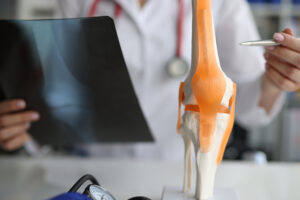Rheumatoid Arthritis Treatment in Arlington, VA

Rheumatoid arthritis is a chronic inflammatory condition that occurs when the body’s immune system mistakenly identifies healthy cells as harmful invaders and releases inflammatory chemicals to attack them. The causes are not well understood. In addition to eroding the joint lining (synovium), the resulting inflammation can damage the skin, eyes, lungs, heart, blood vessels, kidneys, salivary glands, nerves and bone marrow.
What Are the Signs of Rheumatoid Arthritis?
The symptoms of rheumatoid arthritis may include:
- Chronic joint pain, tenderness, warmth and swelling
- Joint stiffness that worsens with rest and inactivity
- Flu-like symptoms, such as general malaise and low-grade fever
- Loss of appetite
Early-stage rheumatoid arthritis tends to affect small joints on both sides of the body, such as those that attach the fingers to the hands and the toes to the feet. As the inflammation progresses, the symptoms often spread to larger joints in the wrists, elbows, shoulders, ankles, knees and hips.
Rheumatoid arthritis symptoms can vary in severity and may come and go. It is important to see a physician as soon as possible; if left untreated, the inflammation can cause joints to shift out of place and become deformed.
How Is Rheumatoid Arthritis Diagnosed?
The diagnostic process typically begins with a medical history review and a physical examination. If rheumatoid arthritis is suspected, the physician may order blood work to measure the levels of certain antibodies, such as rheumatoid factor (Rf) and anti-cyclic citrullinated peptide (CCP). Other blood tests can identify inflammation markers, such as erythrocyte sedimentation rate (ESR) and C-reactive protein (CRP). Additionally, imaging tests such as X-ray, ultrasound and magnetic resonance imaging (MRI) scans may reveal joint damage.
How Is Rheumatoid Arthritis Treated?
Although there is no cure for rheumatoid arthritis, the pain and inflammation can often be managed with medications, such as nonsteroidal anti-inflammatory drugs (NSAIDs) and disease-modifying antirheumatic drugs (DMARDs). Physical therapy can improve joint flexibility, and assistive devices such as buttonhooks can be used to reduce the stress on damaged joints. Self-care measures such as eating a nutritious diet, exercising regularly, maintaining a healthy body weight and quitting smoking can promote good health in general and help control rheumatoid arthritis symptoms in particular.
See a Specialist in Arlington
If you have chronic joint pain or other symptoms of rheumatoid arthritis, you can consult with an orthopedic specialist at Nirschl Orthopaedic Center. To request an appointment at our office in Arlington, VA, contact us at (703) 525-2200 today.
